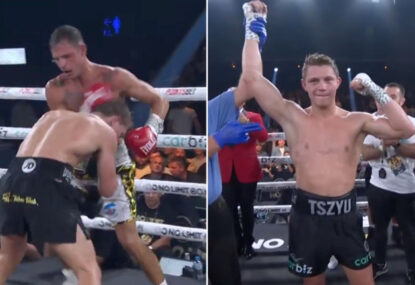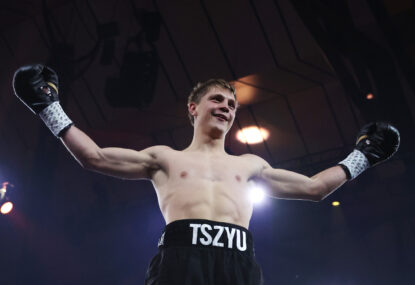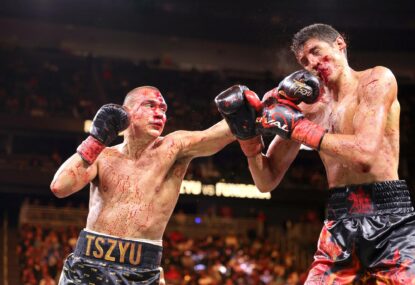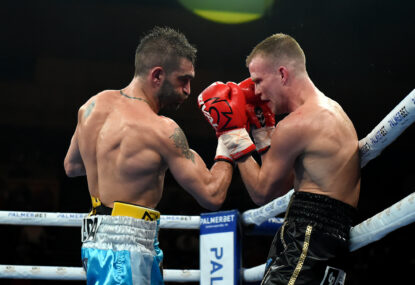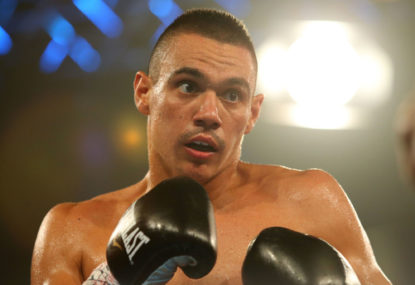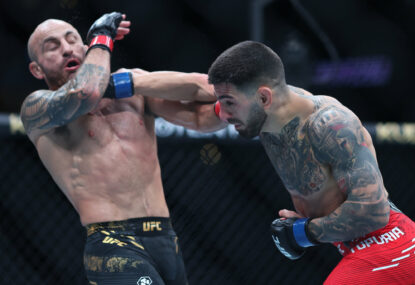Former world cruiserweight and reigning WBA heavyweight titlist David Haye gets his wish this weekend and will meet one of the Klitschko brothers, IBF and WBO titlist Wladimir Klitschko.
The fight is the most meaningful heavyweight title fight since Mike Tyson was battered by Lennox Lewis back in 2002 at the Pyramid in Memphis.
Haye also looks to become the first cruiserweight to win a heavyweight title since Evander Holyfield knocked out James ‘Buster’ Douglas in 1990.
In the history of the division often fighters have come up to heavyweight where, up until the last 25 years, the major money fights have almost exclusively taken place, yet only three recognised world champions in lower weight divisions have taken the heavyweight title.
A closer look into those fights, and others where lighter men have challenged, and sometimes even captured the title, shows that size isn’t always the big factor it’s made out to be.
‘Gentleman Jim’ Corbett vs Bob Fitzsimmons, 17th March 1897
The first gloved heavyweight champion James J. Jeffries put his title on the line against middleweight champion and future light heavyweight champion Bob Fitzsimmons.
Corbett came into the fight with a near 8kg weight advantage (83.5kg to Fitzsimmons’ 75.5kg). Corbett busted up Fitzsimmons early, using his better technical skills to bloody Fitzsimmons’ face with an accurate left jab.
Fitzsimmons began to come on as the rounds wore on, wearing Corbett down with body shots before a left to the solar plexus put Corbett down for the count in round 14, making Fitzsimmons the first man to win world titles in two weight divisions.
Jack Johnson vs Stanley Ketchel, 16th October 1909
Jack Johnson, the first coloured heavyweight champion, put his title on the line against middleweight champion Stanley Ketchel, a ferocious slugger with extraordinary power for his weight division.
Unlike Corbett, Johnson was a heavyweight by todays standards and had a 16kg weight advantage over Ketchel (93.2kg to Ketchel’s 77.2kg). There was a friendly agreement in this bout that Johnson would carry Ketchel the 20 round distance so as not to ruin the middleweights reputation.
However Ketchel’s confidence grew as the fight wore on, and in round 12 he got his range and dropped Johnson. Johnson easily beat the count, then perfectly timed Ketchel’s follow up assault with right uppercut which left ‘The Michigan Assassin’ unconscious with several of his teeth embedded in Johnson’s glove.
Despite the weight advantage, Ketchel was able to show that a smaller man with the right sort of punching power can do damage to a heavyweight.
Jack Dempsey vs Georges Carpentier, 2nd July 1921
The first million dollar gate in boxing history occurred in this fight as the Light Heavyweight champion Carpentier, who was marketed as a French war hero, challenged heavyweight champion ‘The Manassa Mauler’ Jack Dempsey, accused by the press of being a draft dodger.
7.3kg separated the two men, Dempsey weighing 85.3kg to Carpentier’s 78.0. This was a fight where Dempsey’s size was a large factor, but it had to be combined with aggression.
Carpentier broke his right hand early in the fight when he landed his trademark right cross on Dempsey’s forehead but it was when Dempsey brought the fight in close and worked Georges’ body that the fight turned his way.
Dempsey ended matters in the third round in front of a crowd of 80,000+.
Jack Dempsey vs Gene Tunney, 23rd September 1926 and 22nd September 1927
Despite both men being roughly the same weight, Gene Tunney is actually regarded as one of the greatest light heavyweights of all-time having defeated the likes of former light heavyweight champions Georges Carpentier and Battling Levinsky as well as middleweight great Harry Greb.
Tunney fought much of his career as a light heavyweight and only fought at heavyweight at the end of his career whe he pursued the fight with Dempsey.
In their first meeting, Tunney used superior boxing skills to outscore Dempsey over ten rounds easily to take the title.
The rematch was more of the same, except in round seven, Dempsey was finally able to catch the fleet-footed Tunney on the ropes and delivered a devastating combination of punches to the champion’s head.
Tunney went down, and was down for 14-15 seconds before he rose as the referee spent time trying to get Dempsey to the neutral corner before he started his count. Tunney cleared his head and put Dempsey down in round 9 to retain the title.
Joe Louis vs Billy Conn, 18th June 1941
“The Brown Bomber’ Joe Louis, the man who held the heavyweight title for 14 years and defended it 25 times, put his title on the line for the 18th time against light heavyweight champion Billy Conn.
Louis took a near 12kg advantage into the fight (90.5 to Conn’s 78.9) and considering Conn had once fought as a middleweight and Louis was light for his standards in the fight, the size difference was big.
Despite this for 12 rounds Conn-Louis I looked very much like Tunney-Dempsey I, with the smaller quicker man taking the dangerous punching heavyweight champion to school.
In round 12 Conn rocked Louis with a series of punches before the bell and made the mistake of trading with Louis in round 13 in an attempt to finish him.
Louis, way behind on the scorecards, produced a devastating combination of punches which put Conn down and out.
Ezzard Charles vs Jersey Joe Walcott, 22nd June 1949
‘The Cincinnati Cobra’ Ezzard Charles is considered by many to be the greatest light heavyweight of all-time.
His wins at the lower weight include three over future champion Archie Moore, two over Charley Burley, two over future champion Joey Maxim and a knockout over another champion Gus Lesnevich among others.
He also gave Rocky Marciano two of his hardest fights and was the only man to defeat Joe Louis in a title fight. Against Walcott, the man who had nearly twice taken Louis’ title in his final two title defences, he gave away over 5kg (82.6 to Walcott’s 88kg).
Charles soundly outpointed the cagey Walcott in their first two fights before losing the title to him in 1951 and again in a rematch.
Rocky Marciano vs Archie Moore, 21st September 1955
Like Ketchel almost 50 years before him, ‘The Old Mongoose’ Archie Moore had the type of punching power that carried to any weight division.
Fighting as low as middleweight in his younger years, Moore moved up the weight classes and travelled the world in search of consistant paydays and a shot at the title.
His shot finally came in 1952 when he took the light heavyweight title from Joey Maxim. He took on heavyweight champion Rocky Marciano in 1955 after defending his title four times and outpointing highly rated heavyweight contender Nino Valdes.
Moore dropped Marciano with a counter right hand in the 2nd round and was fighting evenly with Marciano but at 39 years of age and with a bigger, stronger challenger fighting in the aggressive style that Marciano always employed, Moore tired as the fight wore on and was eventually taken out in the 9th round.
Joe Frazier vs Bob Foster, 18th November 1970
Frazier (weighing in at 94.8kg) was too big and too aggressive for the long-time light heavyweight champion Foster (85.3). Frazier made quick work of the challenger, knocking him out in the 2nd round.
Larry Holmes vs Michael Spinks, 21st September 1985
Spinks broke two records when he won this fight; he became the first brother of another heavyweight champion to win the title after his brother Leon beat Muhammad Ali in 1978 and he became the first light heavyweight champion to win the heavyweight title.
Spinks gave Holmes almost 10kg (90.6 vs 100.5kg) in this fight but outworked the fading long-time champion to take the 15 round decision and followed it with a win in the rematch.
James ‘Buster’ Douglas vs Evander Holyfield, 25th October 1990
Douglas ruined the mega fight between Holyfield, the undisputed cruiserweight champion and top heavyweight contender, and Mike Tyson when he sensationally knocked Tyson out in Tokyo in February of that year.
Holyfield had moved up chasing the Tyson fight and taken out a number of contenders and former titlists to earn his shot.
The Douglas that fought Tyson was not the same man who fought Holyfield. A prolonged court case with promoter Don King had left him demoralised and he trained poorly for the Holyfield fight.
Holyfield countered a wild uppercut in the 3rd round with a well placed right cross which dropped Douglas, who opted to be counted out rather then take the beating he was in for against a superior fighter on the night.
Despite only Spinks being recognised as a light heavyweight champion who has won the heavyweight championship, many fighters have come up in weight to take the title.
Both Charles and Tunney are rated among the greatest light heavyweights of all-time partly based on their achievements against bigger men at heavyweight.
Bob Fitzsimmons, at just 167lbs, won the title by wearing down and knocking out the larger, more skilled boxer in Corbett.
David Haye may already hold a title at this weight, but it’s not one taken seriously but he was the legitimate cruiserweight champion. His punching power at the weight was phenomenal and he has proven it at heavyweight having knocked out the durable John Ruiz in a title defence.
The other factor in this fight is the way Klitschko fights. He doesn’t fight in the aggressive style of a Joe Frazier, Rocky Marciano or Jack Dempsey, a style that is likely to wear on Haye as the rounds go on.
Instead he fights a measured, cautious fight preferring to wait until his opponent is battered unrecognisable before trying to take him out. Against someone like Haye, who has explosive speed to go with his power, the measuring may only give Haye the time he needs to get the distance and take Klitschko out.






























































































